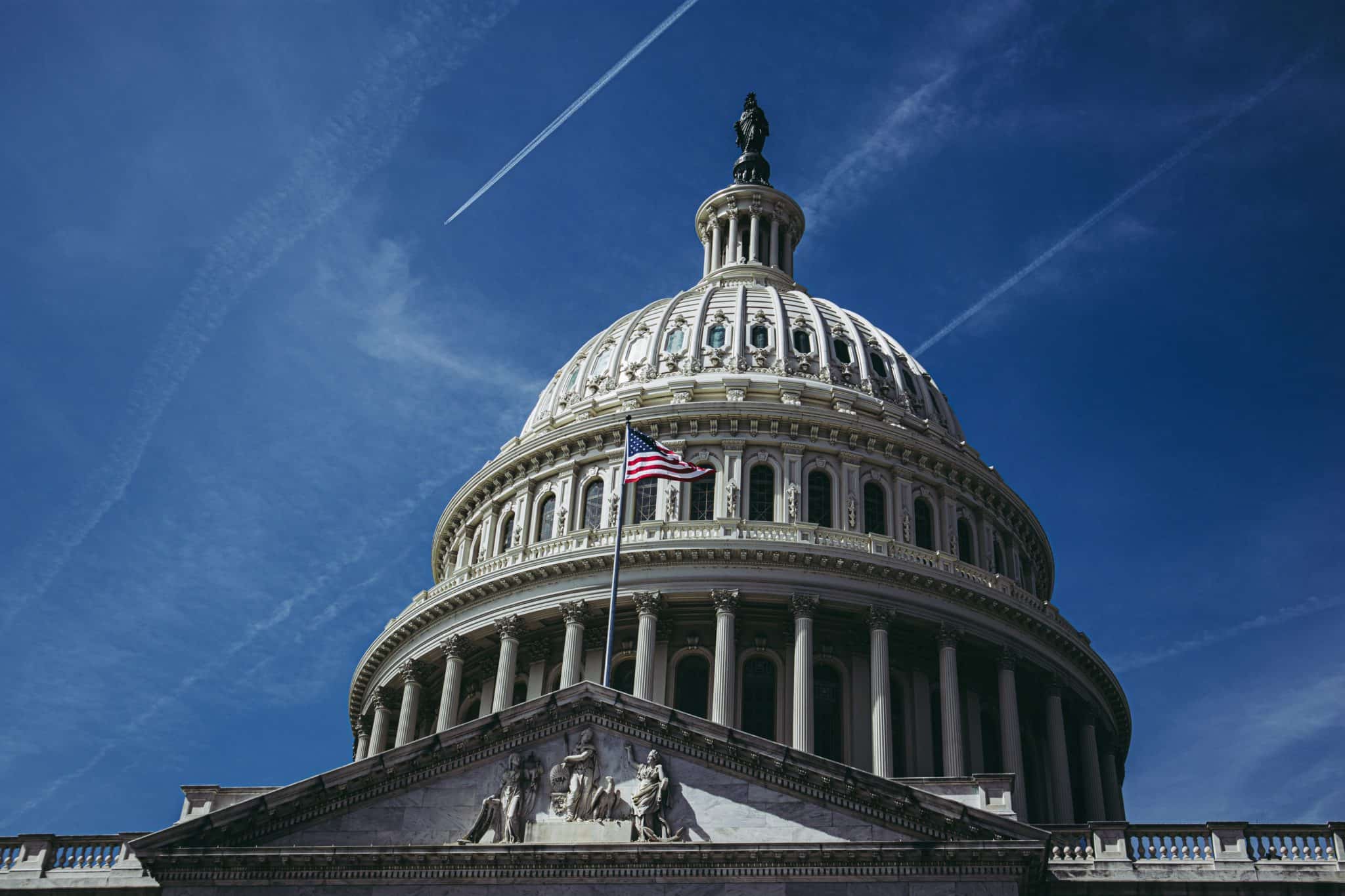
Kevin Vazquez is a staff attorney at the International Brotherhood of Teamsters. He graduated from Harvard Law School in 2023. The opinions he expresses on this blog are his own and should not be attributed to the IBT.
On Saturday, the Senate voted 50-49 to pass Democrats’ $1.9 trillion stimulus package, the American Rescue Plan Act of 2021, after a marathon debate that lasted for more than 24 consecutive hours. The package was passed through the budget reconciliation process, meaning that it required only 50 votes to make it out of the chamber. All Democratic senators voted in favor of the bill, and all Republican senators present voted against it. Senator Dan Sullivan from Alaska, who returned to his home state on Friday, did not vote, so Vice President Kamala Harris was not required to cast the tie-breaker.
Despite weakening several provisions included in the House version passed last month, the Senate bill is a momentous, comprehensive, and nearly unprecedented package that will offer overdue relief to millions of desperate and struggling Americans. It includes $1,400 checks for individuals who made less than $75,000 last year or married couples who made less than $150,000, and it progressively phases out payments at higher income levels, capping them for individuals who made more than $80,000 or couples who made more than $160,000. It also includes $350 billion in aid to state and local governments, $130 billion in funds for K-12 schools, $300 weekly unemployment benefits (which will continue until September 6), a $3,000 fully refundable Child Tax Credit for children age 6-17 and a $3,600 credit for children age 0-6, and $100 billion in public health funding. In addition, the bill sets aside $14 billion for COVID-19 testing and vaccination, shores up multiemployer and single-employer pension plans, and strengthens provisions of the Affordable Care Act.
After Democratic leadership in the Senate made concessions to a handful of more conservative Democrats, particularly Sen. Joe Manchin, whose vote was necessary for the bill to pass, the Senate’s amended bill watered down many provisions of the House’s version substantially. Under the House’s plan, for example, the size of the payments would have progressively scaled down after an individual made $75,000 or a couple made $150,000, just like in the Senate version, but the payments would not have zeroed out until an individual had made $100,000 or a couple had made $200,000. Consequently, 12 million fewer adults and 5 million fewer children will receive relief checks under the Senate version as compared to the House version, or 5 percent less of (relatively affluent) American households – many of whom switched parties to vote for Joe Biden in the 2020 election. As Eric Levitz notes in New York Magazine, this change essentially creates an extremely high marginal tax rate for a narrow class of workers: “A taxpayer who earned $80,000 in 2020 will effectively pay a 70 percent tax rate on his last $5,000 of income.”
It is difficult to understand this move from moderate Democrats. It cannot be justified ideologically or chalked up to “fiscal responsibility” – the amendment, as the Washington Post’s Jeff Stein notes, saves only $12 billion of a nearly $2 trillion, deficit-financed stimulus package. It can also not be explained in terms of raw political calculation: Stimulus checks are overwhelmingly (and broadly) popular, even among corporations! In any event, the package will be sent back to the House, which plans to debate the amended bill on Tuesday before sending it to President Biden to sign the following week. If signed into law, the bill will offer necessary – and long overdue – relief for millions of Americans who are still struggling with the devastation wrought by the coronavirus pandemic. One estimate approximates that it could cut child poverty in half. The package as it stands is far from perfect, but it is nonetheless a momentous occasion and a moment to celebrate – and it would not have happened without the painstaking and unceasing work of activists and organizers, including many labor unions, in Georgia and throughout the country.
In related news, the Senate failed to pass a vote forced by Sen. Bernie Sanders on Saturday to raise the minimum wage to $15 an hour. Last week, the Senate parliamentarian ruled that the proposed wage hike violated the Byrd Rule, which would have meant that, if included in the stimulus package, the bill would not have been able to be passed via budget reconciliation. Sen. Sanders, in response, forced an independent vote on raising the minimum wage – which was included in the House stimulus package. Seven Democrats – Joe Manchin (WV), Krysten Sinema (AZ), Jon Tester (MT), Jeanne Shaheen (NH), Maggie Hassan (NH), Chris Coons (DE), and Tom Carper (DE) – joined independent Angus King from Maine, who caucuses with the Democrats, and all the Republican senators – including Sen. Josh Hawley, the self-titled tribune of the working class – in voting down the provision. Sen. Sanders has vowed to continue fighting for the wage increase, which President Biden purports to support, but its future remains unclear.
At least seven of the eight Democrats (including Sen. King) who voted against the proposal are millionaires, and they are collectively worth more than $40 million. Sen. Krysten Sinema, in particular, has received public ire for dramatically – and, by all appearances, even giddily – voting “nay” with a sprightly and energetic thumbs-down gesture that seemed inappropriate for the circumstances – especially considering that, according to a recent study, more than 800,000 workers currently make less than $15 an hour in Arizona.
Outside of Washington, a week-long Amazon boycott has been planned in solidarity with the unionizing workers in Bessemer. The boycott, which begins today, is a response to Amazon’s increasingly aggressive and hostile anti-union actions, and it will last throughout the end of the week. The boycott campaign asks consumers not to “cross the virtual picket line,” which means not using any Amazon services for the week, including Amazon Prime, its video streaming services, and even its smart speakers. RWDSU has announced, however, that it has not called for and does not endorse the boycott.
Finally, in the wake of the FDA’s approval of Johnson & Johnson’s single-shot vaccine at the end of last month, the third approved in the United States and by far the easiest of the three to transport and distribute, Saturday set a new record for vaccine distribution in the United States with 2.9 million doses administered for a weekly average of 2.16 million doses per day – bringing the total doses administered in the United States just shy of 90 million. President Biden announced last week that the U.S. will have enough vaccine supply by the end of May to inoculate the entire adult population, and, despite a turbulent start, we are well on our way towards that goal.






Daily News & Commentary
Start your day with our roundup of the latest labor developments. See all
February 15
The Office of Personnel Management directs federal agencies to terminate their collective bargaining agreements, and Indian farmworkers engage in a one-day strike to protest a trade deal with the United States.
February 13
Sex workers in Nevada fight to become the nation’s first to unionize; industry groups push NLRB to establish a more business-friendly test for independent contractor status; and UFCW launches an anti-AI price setting in grocery store campaign.
February 12
Teamsters sue UPS over buyout program; flight attendants and pilots call for leadership change at American Airlines; and Argentina considers major labor reforms despite forceful opposition.
February 11
Hollywood begins negotiations for a new labor agreement with writers and actors; the EEOC launches an investigation into Nike’s DEI programs and potential discrimination against white workers; and Mayor Mamdani circulates a memo regarding the city’s Economic Development Corporation.
February 10
San Francisco teachers walk out; NLRB reverses course on SpaceX; NYC nurses secure tentative agreements.
February 9
FTC argues DEI is anticompetitive collusion, Supreme Court may decide scope of exception to forced arbitration, NJ pauses ABC test rule.